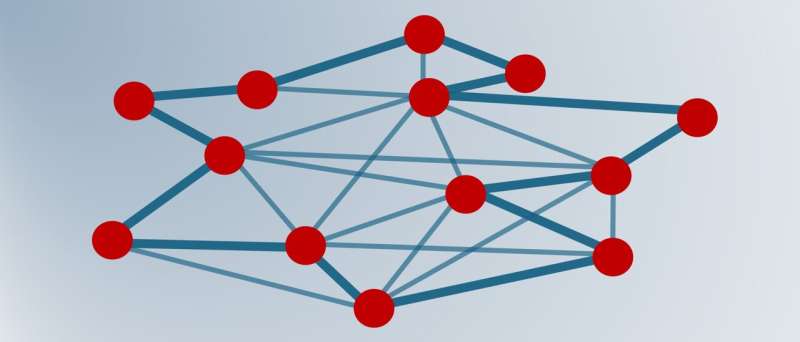This article has been reviewed according to Science X's editorial process and policies. Editors have highlighted the following attributes while ensuring the content's credibility:
fact-checked
trusted source
proofread
Quantum computers can solve combinatorial optimization problems more easily than conventional methods, research shows

The traveling salesman problem is considered a prime example of a combinatorial optimization problem. Now a Berlin team led by theoretical physicist Prof. Dr. Jens Eisert of Freie Universität Berlin and HZB has shown that a certain class of such problems can actually be solved better and much faster with quantum computers than with conventional methods.
The team's work is published in the journal Science Advances.
Quantum computers use so-called qubits, which are not either zero or one as in conventional logic circuits, but can take on any value in between. These qubits are realized by highly cooled atoms, ions or superconducting circuits, and it is still physically very complex to build a quantum computer with many qubits. However, mathematical methods can already be used to explore what fault-tolerant quantum computers could achieve in the future.
"There are a lot of myths about it, and sometimes a certain amount of hot air and hype. But we have approached the issue rigorously, using mathematical methods, and delivered solid results on the subject. Above all, we have clarified in what sense there can be any advantages at all," says Prof. Dr. Eisert, who heads a joint research group at Freie Universität Berlin and Helmholtz-Zentrum Berlin.
The well-known problem of the traveling salesman serves as a prime example: A traveler has to visit a number of cities and then return to his home town. Which is the shortest route? Although this problem is easy to understand, it becomes increasingly complex as the number of cities increases, and computation time explodes. The traveling salesman problem stands for a group of optimization problems that are of enormous economic importance, whether they involve railway networks, logistics or resource optimization. Good enough solutions can be found using approximation methods.
The team led by Eisert and his colleague Jean-Pierre Seifert has now used purely analytical methods to evaluate how a quantum computer with qubits could solve this class of problems, a classic thought experiment with pen and paper and a lot of expertise.
"We simply assume, regardless of the physical realization, that there are enough qubits and look at the possibilities of performing computing operations with them," explains Vincent Ulitzsch, a Ph.D. student at the Technical University of Berlin.
In doing so, the team unveiled similarities to a well-known problem in cryptography, i.e., the encryption of data.
"We realized that we could use the Shor algorithm to solve a subclass of these optimization problems," says Ulitzsch. This means that the computing time no longer "explodes" with the number of cities (exponential, 2N), but only increases polynomially, i.e., with Nx, where x is a constant. The solution obtained in this way is also qualitatively much better than the approximate solution using the conventional algorithm.
"We have shown that for a specific but very important and practically relevant class of combinatorial optimization problems, quantum computers have a fundamental advantage over classical computers for certain instances of the problem," says Eisert.
More information: Niklas Pirnay et al, An in-principle super-polynomial quantum advantage for approximating combinatorial optimization problems via computational learning theory, Science Advances (2024). DOI: 10.1126/sciadv.adj5170
Provided by Helmholtz Association of German Research Centres





















